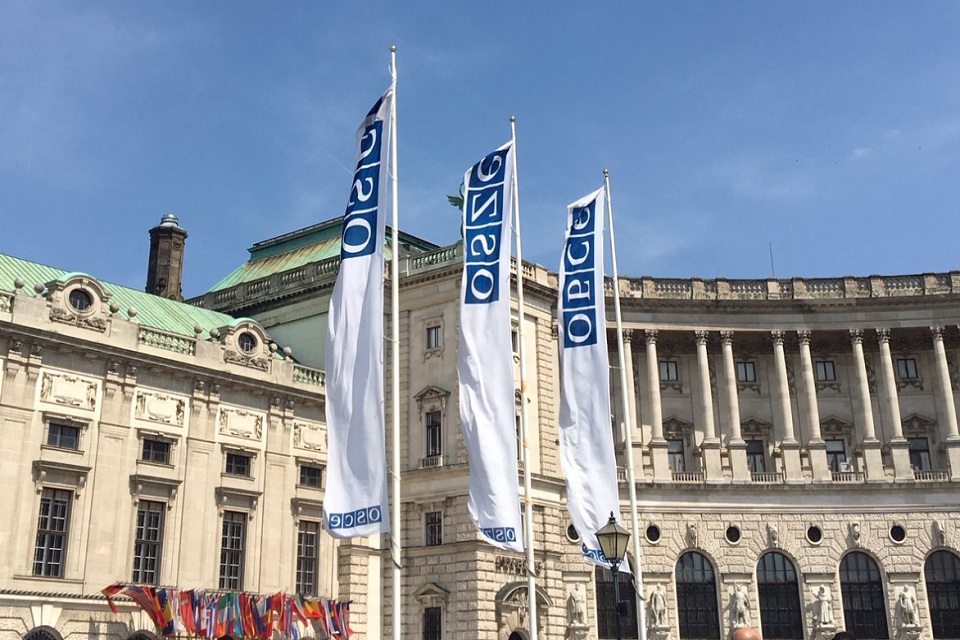Report by OSCE Representative on Freedom of the Media: UK response, May 2022
Ambassador Bush voices UK support for RFoM's work and their focus on Russia's war against Ukraine, and calls out Russia and Belarus for restricting media freedom.

Thank you Mr Chair, I wish to thank the Representative on Freedom of the Media (RFOM), dear Teresa Ribeiro, for your report.
The report had a necessary and justified focus on the impact of Russia’s illegal and unprovoked invasion of Ukraine. It was another stark reminder of what has been happening over the last 85 days.
It reminded us of the journalists that have been killed in Russia’s premeditated and unjustified war. Like the RFOM, we offer our heartfelt condolences to their family and friends.
We are also reminded of the reports of the disappearance, detention and abduction of Ukrainian journalists or their relatives by the Russian military. We recall, with horror, the reported case of the Ukrainian interpreter and fixer for Radio France left in an icy cellar, repeatedly beaten with an iron bar and rifle butts, tortured with electricity, deprived of food for 48 hours and subjected to mock execution.
The three eminent independent experts who authored the recent “Moscow Mechanism” report referenced that case when noting they had “received several credible reports according to which Russian forces arrested civilians, including journalists, without any procedure, and ill-treated them by methods that amount to torture.” The experts’ conclusion? That “this constitutes a war crime.”
We are also reminded of the case of Vladsylav, a freelance journalist sentenced to six years in prison on politically motivated charges, who is reported to have been mistreated and abused while in prison. Yesterday, the RFoM highlighted the abduction of Oleksii Vorontsov, engineer of public broadcaster UA:Kherson, and, rightly, called for his immediate release.
Mr Chair, the RFOM’s report today also highlights that inside the Russian Federation we are seeing “the most severe crackdown on free speech and media freedom of the last 25 years.” The impact of this crackdown is also felt in the temporarily Russian controlled territories of Ukraine, including illegally annexed Crimea, where Ukrainians are subject to the ever-increasing restrictions on media freedom imposed through Russia’s legislation. The actions of the Russian Government are at odds with their obligations under international law and their OSCE commitments. They are at odds with a proper functioning democracy. OSCE participating States agreed in Budapest in 1994 that “freedom of expression is a fundamental human right and a basic component of a democratic society”. People must be allowed to discuss and debate issues freely, to challenge their governments, and to make informed political decisions. The media crackdown in Russia, as described by the RFOM in her report, means that such a free and informed debate is simply not happening in Russia.
Mr Chair, I was not surprised that, just before my intervention, Russia that criticised the RFoM’s work and her report. That’s because they know, in their heart of hearts, as we do, that facts matter. And that in protecting and supporting freedom of expression and media freedom, the RFOM helps defend and promote facts. This is in stark contrast to the Russian Government and their approach of misinformation and disinformation.
We also note the RFOM’s comment that “the dreadful freedom of expression and media freedom situation in Belarus again warrants separate mentioning”. Like the RFOM we remain worried that journalists are being sentenced, arrested or detained for simply doing their work. And that “the practice of continued arrests and convictions of journalists on trumped-up charges is a grave danger to media freedom in the country”. The actions of the Lukashenko regime are not compatible with Belarus’ international obligations and OSCE commitments on freedom of expression and media freedom.
The RFOM’s report highlights the importance of freedom of expression and media freedom to the OSCE’s concept of comprehensive security. We believe the slogan to commemorate 25 years of the RFOM - “no security without media freedom” - is particularly apt at this time of crisis in the OSCE region. Promoting media freedom across the whole OSCE region is a priority for the UK. That is why we greatly value the RFOM’s important work across the whole region, including in the Western Balkans and Central Asia, and on key topics such as the safety of journalists, on restrictive measures at the national level that limit media freedom, and on the dangers of misinformation and disinformation.
Teresa – thank you for your efforts and that of your office. Your work is of the utmost importance as we collectively address the terrible impact of Russia’s illegal invasion of Ukraine. The United Kingdom continues to offer our full support for the important work undertaken by you, and your excellent staff.
Thank you Mr Chair